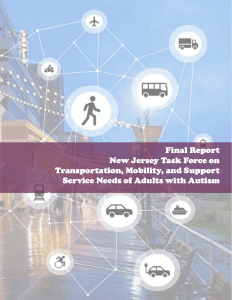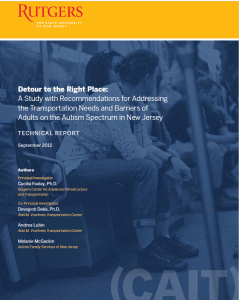Transportation needs assessment project to improve mobility for adults with autism

CAIT Reseracher Dr. Cecilia Feeley
Adults with autism spectrum disorder (ASD) need the same basics we all do-a full social and working life and access to friends, family, and services like healthcare, shopping, learning opportunities, and recreation. The essential link that ties these together—the ability to get from point ‘A’ to point ‘B’—is often overlooked and surprisingly understudied.
Rutgers’ CAIT received a $321,250 grant to assess transportation needs, examine barriers, and provide recommendations to develop procedures and policies that will improve mobility for adults with ASD. It is part of a $4.5 million research program from the Governor’s Council for Medical Research and Treatment of Autism to improve the quality of life for these individuals. For more than three years, CAIT has been committed to the transportation aspect of doing just that.
The Governor’s Council was formed in 1999 under the New Jersey Autism Biomedical Research Act. The council is furthering its mission bolstered by the Combating Autism Reauthorization Act championed by Senator Robert Menendez (D-NJ), a long-time advocate for autism awareness and research funding.
At a press conference announcing the governor’s $4.5 million commitment, Health Commissioner Mary E. O’Dowd said, “This new funding furthers Governor Christie’s ongoing commitment to support the children and families affected by autism. This round of awards focuses both on scientific research as well as developing tools for screening and intervention.”
CAIT project manager Cecilia Feeley will spearhead the effort with partners from Rutgers’ Alan M. Voorhees Transportation Center and Autism Family Services of New Jersey. They will analyze travel patterns, transportation needs and impediments, and lost opportunities due to lack of transportation. Feeley, the mother of a 14-year-old with ASD, hosted Menendez and other advocates and families in her home last October shortly after the Combating Autism Act was passed.
In addition to wide ranging diagnoses, adults with ASD also have diverse skills, abilities, and characteristics. These factors impact their transportation options as much as their geographic location and transit modes available in their area.
Mindful of this, the researchers will cover all 21 New Jersey counties and examine a variety of transportation modes including driving, public transit, paratransit, and walking. The study will include reviewing existing surveys and publications, interviewing transportation and ASD experts, and conducting a statewide scientific survey and series of focus groups of adults with ASD and their guardians.
Although the study will be scientific and data-driven, findings will be presented in clear terms that can be understood by lay people as well as experienced transit agency personnel, transportation planners, and policy makers.
The CAIT transportation needs assessment will give voice to adults with ASD throughout New Jersey so their concerns are more integrated in the development and promotion of beneficial transportation strategies and programs that help them lead more independent and fulfilling lives.
About the Study
CAIT conducted a research study for the New Jersey Department of Health and the New Jersey Governor’s Council for Medical Research and Treatment of Autism to better understand the transportation
and mobility needs of adults on the autism spectrum. Rutgers’ CAIT received a grant to assess transportation needs, examine barriers, and provide recommendations to develop policies that will improve mobility for adults with ASD. A critical part of the study included a transportation needs survey to give voice to New Jersey adults with ASD and their family members and their concerns were integrated into the development and promotion of beneficial transportation strategies and programs in our state.
Explore the final report prepared by CAIT’s Cecilia Feeley and VTC’s Deva Deka and Andrea Lubin that explores and documents transportation needs and barriers of NJ adults on the Autism Spectrum in Detour to the Right Place. This report was prepared with funding from the NJ Department of Health and the NJ Governor’s Council for Medical Research and Treatment of Autism.
Executive Summary – Technical Report
Paratransit Skills Assessment
The Paratransit Skills Assessment (PaSA) was developed as a component for determining the skills required for various types of paratransit services. It is designed for individuals who may have difficulty in utilizing available paratransit services. The PaSA is an assessment designed to evaluate the component skills needed for using ADA complementary paratransit, curb-to-curb paratransit, door-to-door paratransit, door-through-door paratransit and hand-to-hand paratransit.
The PaSA takes approximately 30 to 45 minutes to complete. It is designed to be administered by psychologists, educators, transition coordinators, day program service providers, travel trainers, transit service providers, and parents or guardians. The PaSA is designed to be the first step in using paratransit independently, the assessment should be followed with a ride-along or observed ride with the appropriate supports prior to using the services independently.
The PaSA is designed to represent the communicative and cognitive skills an applicant needs to take various types of paratransit services. The assessment is based on the skills needed to take actual paratransit services. The PaSA is structured for the individual to test from hand-to-hand paratransit services, to door-through-door, to door-to-door, to curb-to-curb and it includes A.D.A. complementary paratransit services. The test also isolates and identifies the skill components needed for hand-to-hand travel on a public paratransit vehicle where the individual will be met by caregivers on both ends of the trip but will travel independently with a driver who may not have training for dealing with a disability.
Paratransit Skills Assessment: Test Protocol – Paratransit Skils Assessment: Test Score Sheet
For more information on this study please contact Cecilia Feeley PhD., Transportation Autism Project Manager, at 848-445-2975 or at cfeeley@soe.rutgers.edu.

Click here to read the final report.
New Jersey Task Force on Transportation, Mobility, and Support Service Needs of Adults with Autism
Created under a 2017 law, the New Jersey Task Force on Transportation, Mobility, and Support Service Needs of Adults with Autism was established to study and make recommendations concerning the mobility and support services needs of New Jersey adults with autism spectrum disorder (ASD), as well as the barriers that these adults may face to accessing transportation services.
Chaired by CAIT researcher Dr. Cecilia Feeley, the Task Force was developed following an earlier study in 2015 conducted by Rutgers University and the Autism Family Services of New Jersey. It was titled Detour to the Right Place: A Study with Recommendations for Addressing the Transportation Needs and Barriers of Adults on the Autism Spectrum in New Jersey. That 2015 study, which the task force is based on, is available in the link above this passage.
That research and report were funded by a 2013 grant from the NJ Department of Health and the NJ Governor’s Council for Medical Research and Treatment of Autism. The grant was to research the transportation needs of people with autism spectrum disorder (ASD) and develop policies, procedures, and accommodations to improve the quality of life of those on the autism spectrum.
About the Report
The Task Force members spent over a year reviewing current practices, barriers, and opportunities for adults with autism spectrum disorder. After analyzing the testimony of the self-advocates and families together with the information provided by state agencies and scholars, the members identified 22 recommendations under 2 categories –14 Transportation and Mobility Focused Recommendations and 8 Support Services and Secondary/Postsecondary Focused Recommendations.
These recommendations included Transportation and Mobility focused recommendations such as ensuring that a portion of all transportation research dollars includes transportation and mobility for people on the autism spectrum, and providing NJ Transit Reduced Fare Cards to all Access Link customers, among others detailed in the report. Additionally the Task Force developed Support Services and Secondary/Postsecondary focused recommendations such as ensuring support program consistency within the New Jersey higher education public university, state college, and county college system, among other suggestions.
“We learned a great deal about the challenges that impact transportation, mobility, secondary support services,” Dr. Feeley said about the Task Force. “We believe that by adopting these recommendations we can improve the quality of life for our fellow New Jersey residents on the autism spectrum.”
Read the final report and complete list of recommendations here.


